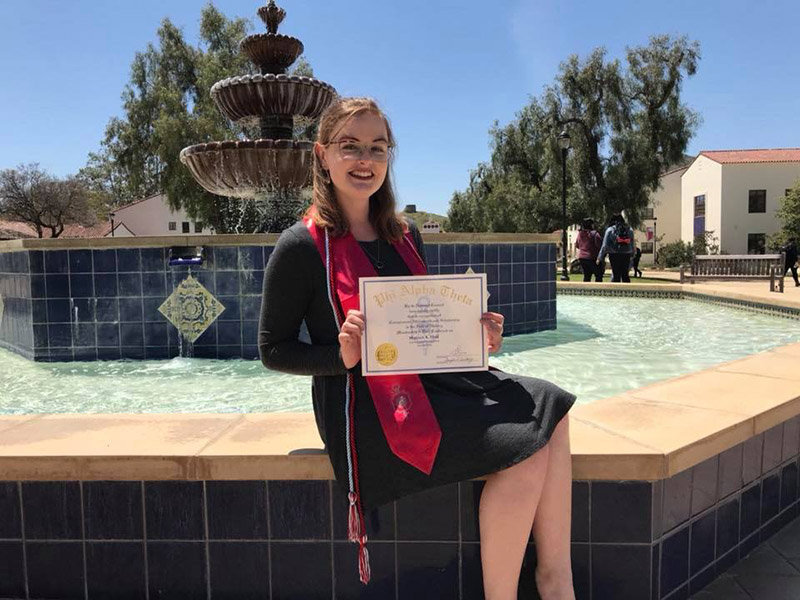CAMARILLO — The marginalization of deaf women through history always fascinated CSU Channel Islands (CSUCI) History alumna Marissa Hull. The absence or misrepresentation of America’s indigenous people intrigued History major Mariah Kelly-Huron.
Their academic interests and achievements have earned both Hull and Kelly-Huron full fellowships to Ph.D. (doctoral) programs in California. In the fall, Hull will enter University of California, Riverside, and Kelly-Huron will go to University of California, Santa Cruz.
Assistant Professor of History Robin Mitchell, Ph.D., who had them both in class, believes both will be a benefit to their individual doctoral programs.
“Marissa is fierce and wonderful,” Mitchell said. “She rallied for more women’s history classes to be taught. She took her career seriously. What I have always loved about Marissa is that she made me work to earn her trust. And once I had it, there was no bar I set that she didn’t reach and then clear. She’s remarkable.”
From Palmdale, Hull, 24, was the first in her family to attend college and largely supported herself throughout her education until she graduated in 2018. She was always interested in history and would read both historical fiction and non-fiction growing up.
She learned American Sign Language (ASL) at the age of 18 in order to earn extra academic credit and fell in love with the visual, expressive nature of ASL. She began working as an interpreter with the deaf community.
Through working with deaf women, Hull noticed there was not much written about them in history books, with Helen Keller as a rare exception, so she began specializing in gender and disability when studying history.
“People still behave differently toward deaf people and for women it’s worse,” she said. “It’s a kind of marginalization. I want to teach and I want to write. My ideal goal is to be able to have specific classes for gender and disability.”
Mitchell described Kelly-Huron as “the quiet one.”
“She barely spoke above a whisper when I first met her,” Mitchell said. “I had to keep asking her to speak louder because I wanted her to understand that what she had to say mattered, and that she deserved to be listened to. And she opened her mouth and the most amazing things came out of it. She is a scholar at heart.”
Raised near Sacramento, Kelly-Huron’s dad was from Oklahoma and her paternal grandmother was Comanche, so Kelly-Huron is a registered member of the Comanche tribe.
Kelly-Huron, 22, has always been interested in Native American history that has been lost or forgotten, so she minored in both Chicana/o Studies and Anthropology. As she prepares to graduate on May 18, she is researching a 19th Century woman with an unusual history.
“Her name was Cynthia Ann Parker and she was taken captive by the Comanche and raised by them as a fully-recognized member of the tribe,” she said. “She had three children and married a chief. After 25 years she was taken back to her family in Texas, but she no longer knew them. I’ve been trying to uncover what her life was like during those 25 years.”
Assistant Professor of Chicana/o Studies, Jennie Luna, Ph.D., had her in several classes, including one class on the Nahuatl language (an indigenous language spoken in Mexico and Central America), where Kelly-Huron was able to draw critical language and cultural connections to her own Comanche heritage.
“She is dedicated to Indigenous language studies, Danza Mexica, Native women’s oral histories, and indigenous feminisms,” Luna said. “I am proud that her minor in Chicana/o Studies provided a space for her to explore her own mixed heritage and Ethnic identities in order to draw strength and deeper knowledge of herself, her family, and her community.”
Mitchell added that both are students she will always remember and she can’t wait to call each of them “doctor.”
About California State University Channel Islands: CSU Channel Islands (CSUCI) is reimagining higher education for a new generation and era. We are an innovative higher education institution that enables students to succeed and thrive – serving as an engine for social and economic vitality that provides the intellectual resources necessary for a thriving democracy. With more than 7,000 students, 1,200 employees and 14,000 alumni, CSUCI is poised to grow in size and distinction, while maintaining one of the most student-focused learning environments in public higher education. Connect with and learn more by visiting www.csuci.edu or CSUCI’s Social Media.


